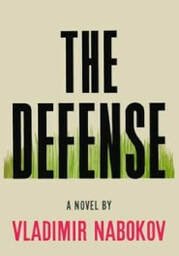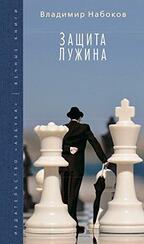
"I would like to spare the time and effort of hack reviewers—and, generally, persons who move their lips when reading and cannot be expected to tackle a dialogueless novel when so much can be gleaned from its Foreword—by drawing their attention to [the following details]…"
It's a fine, reasonably engaging thematic idea, delivered in precise, sometimes humorous prose and explored and staged successfully. But Nabokov wants to make sure he receives credit for the grander literary strategies he employs as well. After pointing out for us some symbolist imagery that has been laid in during the early chapters (thus making it intentional, you see), he makes sure we appreciate the recurring notion of a checkerboard pattern from which our protagonist cannot escape. Again from the Foreword:
"….That floor with the white and blue squares where he found and scanned from his throne imaginary continuations of the match game in progress; or a teasingly asymmetrical, commercially called 'agate,' pattern with a knight move of three arlequin colors interrupting here and there the neutral tint of the otherwise regularly checkered linoleum between Rodin's 'The Thinker' and the door; or certain large glossy-black and yellow rectangles whose H-file was painfully cut off by the ocher vertical of the hot-water pipe…"
What we (the readers) are left with is a story that is often handsomely written and sturdily crafted, but which rarely has energy or narrative drive. I turned the pages as a matter of duty rather than from a desire to see what will happen next; that impish Foreword also chooses to reveal the novel's concluding, climactic moment in its fourth paragraph. Nabokov wants us so ensconced in the descriptive details of the scene—all the better to paint Luzhin as a slobbish, sad figure when contrasted against comfortable, elegant settings—that there is little urgency to most of the moments, either mental or physical. Luzhin's Chapter Eight tournament confrontation of his nemesis Turati marks a high point, and here the reader feels Luzhin's tension and disorientation brilliantly. For a novel where the author revels in his chess-like manipulation of thematic ideas, it is ironic that the book might have been more effective at half its length; doing so might eliminate the feeling that we move from one emotional plateau to another and instead give Luzhin's arc and descent some streamlined immediacy. But what do I know? I'm a terrible chess player.
Let me note two things: I haven't read much of Nabokov, but what I have experienced (aside from the lesser Luzhin Defense) has been beguiling and memorable. Lolita (1955) truly is chess-like in its allusions and masterful in how the author builds Humbert Humbert as a delusional narcissist who is somehow both pathetic and strangely charming. And the slim 1930 novel The Eye is both a satire of detective fiction and a playful meditation on how (and why) to validate individual existence. I'm sure I will read more Nabokov, but this particular book felt superficial and precocious.

Yet I chose it because the plot sounded intriguing—it was more so in concept than in languorous execution—and because Nabokov biographer Brian Boyd called The Luzhin Defense one of the author's "most heartwarming works, and the one I often recommend to wary readers as the place to begin." If so, then those neophytes (who may very well move their lips as they read) will need to exercise patience, as characters, plot, and prose alone are hardly gripping enough to keep one interested in the moves on the board as we advance listlessly toward checkmate.
 RSS Feed
RSS Feed